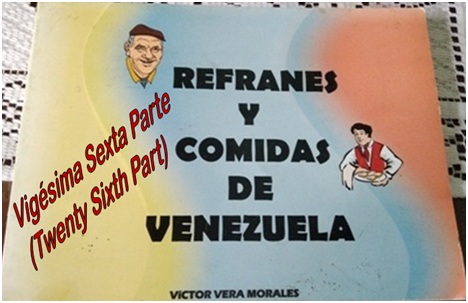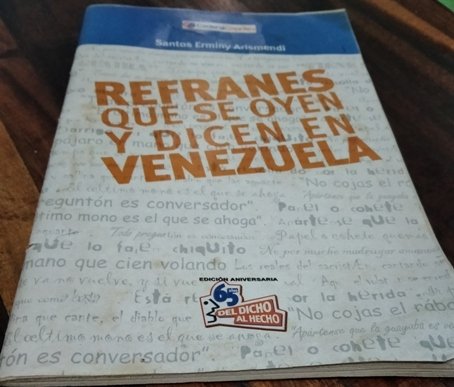[ESP/ENGL] Cinco sabios refranes venezolanos (Vigésima Sexta Parte) // Five wise Venezuelan sayings (Twenty sixth part)


Dicho que se emplea para indicar que se conoce ampliamente una situación desagradable o anómala, por eso se dice que de esa cabuya (hecho negativo) se tiene un rollo u gran cantidad de cordel; aplicable por ejemplo, de alguien que promete lo que no va a cumplir; o de un evento desagradable, como sería una pelea constante, un ambiente de agravio. Es un refrán que se utiliza para manifestar rechazo sobre un asunto en particular.
Se utiliza este refrán para señalar que si hay alguien flojo, no podrá quedarse dormido y roncar porque existe una autoridad que le exige rendimiento en el trabajo. También se emplea para indicar que aquellos que son valientes o bravucones no pueden alardear porque existe alguien (tigre), que los pondrá en su sitio.
Refrán que se origina en el ámbito de los cazadores, y se utiliza para señalar sorpresa por algo que no se esperaba, ya que a veces, cuando los cazadores están en el monte, están esperando la presa (liebre), por un lado y sale por el contrario. También es útil para recalcar el desagradecimiento de alguna persona, de la cual no se esperaba una actitud negativa.
Esto quiere decir que huyó, y es que generalmente en las peleas físicas, a veces los contrincantes podían halarse de los cabellos, y el perdedor al huir, simplemente le dejaba mechones de su cabellera (pelero) al contrincante. Es un dicho que se utiliza para señalar eso, huída rápida y veloz.
En el santoral católico, Santa Lucía es la santa que se encarga de curar las enfermedades de la vista. A ella se recurre al tener alguna lesión, eventualidad o enfermedad en esa área tan importante del cuerpo. Ahora bien, cuando se dice que después de ojo sacao no vale Santa Lucía, es que ya no existe solución ni disculpas ante un mal o ante un evento negativo. Ya no tiene solución.



A saying that is used to indicate that one is widely aware of an unpleasant or anomalous situation, that is why it is said that of that string (negative fact) one has a roll or a large amount of string; applicable for example, of someone who promises what he will not fulfill; or of an unpleasant event, such as a constant fight, an atmosphere of aggravation. It is a saying that is used to express rejection on a particular matter.
This saying is used to indicate that if someone is lazy, he cannot fall asleep and snore because there is an authority that demands performance at work. It is also used to indicate that those who are brave or bullies can not boast because there is someone (tiger), who will put them in their place.
A saying that originates in the field of hunters, and is used to indicate surprise for something that was not expected, since sometimes, when hunters are in the bush, they are waiting for the prey (hare) on one side and it comes out on the other. It is also useful to emphasize the ungratefulness of some person, from whom a negative attitude was not expected.
This means that he fled, and is that generally in physical fights, sometimes the opponents could pull each other's hair, and the loser to flee, simply left strands of his hair to the opponent. It is a saying that is used to indicate that, fast and quick escape.
In the Catholic saints' calendar, Saint Lucia is the saint in charge of curing eye diseases. She is called upon when there is an injury, eventuality or illness in this important area of the body. Now, when it is said that after the eye is removed, Saint Lucia is no longer valid, it means that there is no solution or apology for a bad or negative event. There is no solution.
.png)
Dear readers, below I place the links of the first 25 posts, in case you want to read them:
Víctor Vera Morales. (Agosto 2004). Refranes y Comidas de Venezuela. Editado por el Instituto Municipal de Publicaciones de la Alcaldía de Caracas.
Santos Erminy Arismendi. (2006). Refranes que se oyen y dicen en Venezuela. Cadena Capriles, Caracas. Venezuela.
- Fotos de mi autoría, tomada con un teléfono REDMI 8A, intervenida con WordArt / Photos of my authorship, taken with a REDMI 8A telephone, intervened with WordArt.
- Los diseños incluidos en esta publicación, han sido elaborados por mi persona con la aplicación CANVA / The designs included in this publication has been made by me with the CANVA application.
In the event that it is required to use the content or images of this post and my other publications, I would be grateful if my authorship (Fabiola Martínez) was made and the corresponding link was cited. Thank you.

 CommunityIIDiscord
CommunityIIDiscord
https://twitter.com/sirenahippie1/status/1432160662449426439?s=20
Excelentes refranes, somos muy expertos en este lenguaje coloquial, me encanta que compartas estos refranes, ya que es una forma de mantener esa costumbres venezolanas.
Gracias a tí por pasar a leer mi seriado. Me alegra mucho que te guste. Un gran saludo.